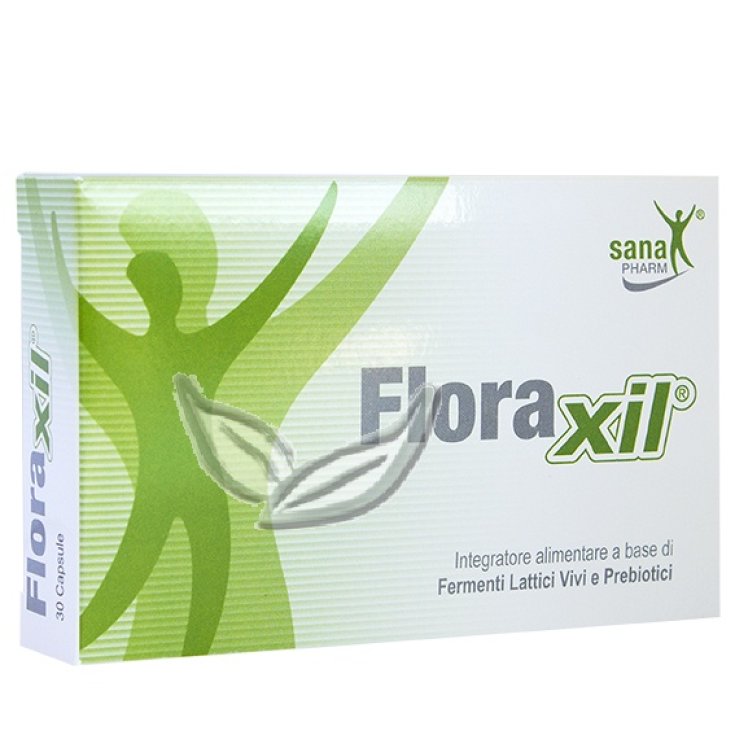SanaPharm FloraXil® Food Supplement 30 Capsules

- Brand: ORIGINI NATURALI Srl
- Product Code: 903997195
- EAN:
- Availability: In Stock
- Purchase 3 items for 13.15€ each
- Purchase 4 items for 12.88€ each
- Purchase 5 items for 12.61€ each
SanaPharm
FloraXil®
Dietary supplement
COMPOSITION :
Bifidobacterium bifidum on maltodextrin (10 billion live cells / g), Lactobacillus acidophylus on maltodextrin (10 billion live cells / g), Lactobacillus Rhamnosus (4 billion live cells / g), fructooligosaccharides from chicory; maltodextrin fermented from rice starch.
OWNERSHIP :
The natural intestinal bacterial flora is made up of a series of microorganisms capable of producing B vitamins, vitamin K, short-chain organic acids and other useful substances, and often necessary for our life, hence the name of PROBIOTIC bacteria. Probiotics are a series of microorganisms present in dominant quantities in the intestine that live in symbiosis with our organism, also called symbiotic bacteria. A decrease or destruction of the natural bacterial flora leads to the prevailing of other types of bacteria capable of causing a series of disorders ranging from excessive intestinal fermentation, due to the development of putrefactive and gas-forming bacteria responsible for intestinal swelling, flatulence, halitosis, having a negative effect also on the appearance of the skin, to the proliferation of pathogenic microorganisms such as candida, affecting the adjacent intimate areas, especially in women. The alteration of the normal intestinal bacterial flora is mainly caused by diarrhea, use of antibiotics, chronic use of laxatives, incorrect diet and stress. In these cases it becomes necessary to supplement with strains of microorganisms with a specific PROBIOTIC action capable of rapidly restoring the natural balance of the intestine. The microorganisms belonging to the genus Bifidobacterium are anaerobic, non-motile, Gram-positive, saccharolytic bacteria that produce acetic and lactic acid, without generating CO2, finally produce appreciable quantities of vitamins B1, B2 and K, and it is therefore no coincidence that they are the first microorganisms that colonize the human gastrointestinal tract. To date, 30 species of bifidobacteria have been isolated. Those present in Floraxil belong to the most studied strains, namely Bifidobacterium Bifidum which fully meets the requirements for a probiotic in particular: it prevents colonization of the intestine by pathogenic bacteria, produces lactic acid and acetic acid which lower the pH of the intestine , thus making the environment hostile to the proliferation of pathogenic microorganisms, it inhibits those bacteria capable of transforming nitrates, present in food, water, into nitrites, potentially carcinogenic substances, synthesizes B vitamins essential for our organism. Bifidobacteria are normally present in the large intestine or colon, unlike lactobacilli located in the small intestine, newborns, especially those who are breastfed, are colonized within days of birth by bifidobacteria. Immediately after birth, the bifidobacteria population grows rapidly until reaching quantities of 1010 - 1011 units per gram of feces, which represent 25-30% of the entire intestinal microbial flora. In breast-fed infants bifidobacteria represent the dominant species, while lactobacilli, enterococci and coliforms reach less than 1% of the population and bacteroids, clostridia are virtually absent. With age, bifidobacteria progressively reduce. In adulthood, Bacteroides represent 85% of the microbial flora and bifidobacteria are reduced to 6-10% while other anaerobes appear including clostridia, coliforms, streptococci and veilatoi. The relationships between genera and microbial species in adulthood are very influenced by the diet, with constantly higher percentages of bifidobacteria in subjects who consume a vegetarian or semi-vegetarian diet, contrasted with minimal or no charges for diets with a reduced fiber content typical of societies westerners. Lactobacilli Acidophylus constitute the most studied class of probiotics. There are about 300 strains but only 13 meet all those requirements necessary for a microorganism to be usefully used as a probiotic. As already explained in the introduction, our organism naturally possesses lactobacilli but the living conditions, the increasingly refined diet cause devastating effects on our intestinal flora. Integrating our diet with probiotics is therefore essential. This opinion is increasingly widespread, so much so as to witness the proliferation of foods enriched with lactic ferments almost everywhere, from the pharmacy to the supermarket. Choosing the right product becomes difficult and in most cases you have to rely on the reliability of the supplier companies. In Floraxil the lactobacilli acidophylus have been carefully and scrupulously selected and are part of the 13 strains indicated above as they fully meet the following requirements: they can be produced on a large scale in viable form, during use and storage they remain vital and stable, they survive in the intestinal ecosystem, reaching intact and in vital form the small intestine where these types of ferments stabilize, therefore they are able to overcome all those physical and chemical barriers such as gastric acidity and bile salts. To make the composition more vital, another lactobacillus was added: Lactobacillus Rhamnosus. Also extensively studied that fully meets the requirements of probiotics with the particularity of producing lactic acid such as to make the acid environment, hostile to the proliferation of pathogenic bacteria. In conclusion, the relationship between eating habits, intestinal pathologies and diet quality appears close to the point of providing for the use of fiber supplementation in daily clinical practice. The action of lactobacilli is synergized by prebiotics, such as fructoligosaccharides, which are obtained by hydrolysis from inulin extracted from chicory, are non-digestible sugars with the property of being the exclusive nourishment of lactobacilli as the pathogenic bacteria are unable to assimilate these carbohydrates . Fermented Rice Starch is a multi-enzymatic complex of vegetable origin, obtained from the controlled fermentation of a vegetable substrate. The production process consists in the fermentation of rice starch mainly by a mushroom, “Aspergillus Oryzae”, well known in Japan for the production of miso and sake. This enzymatic complex is made up of a pool of more than 30 digestive enzymes involved in all digestive processes: proteins, carbohydrates, and lipids. In addition there are enzymes such as lactase for the digestion of lactose, and cellulase for the digestion of cellulose. Fermented Rice Starch therefore plays an important role in digestion.
INDICATIONS :
Floraxil is useful in all forms of colitis, constipation and diarrhea. It is used in the prevention and treatment of certain gastrointestinal conditions, including antibiotic-associated diarrhea, some bacterial and viral infection diarrhea, lactose intolerance, sucrose and maltose deficiencies, inflammatory bowel disease, and whenever we are confronted with it. to dysmicrobisms and the restoration of the microflora becomes essential. Other evidence suggests a possible use in recolonization of the vagina in women with recurrent vaginitis. Thanks to the presence of fermented rice starch it is useful in all cases of post-prandial swelling, abdominal tension, nausea, and in all cases of digestive difficulties.
METHOD OF USE:
2 or 3 capsules a day, preferably in the morning with plenty of water. Different posologies may be recommended by the pharmacist or doctor.
SIZE :
30 Capsules

